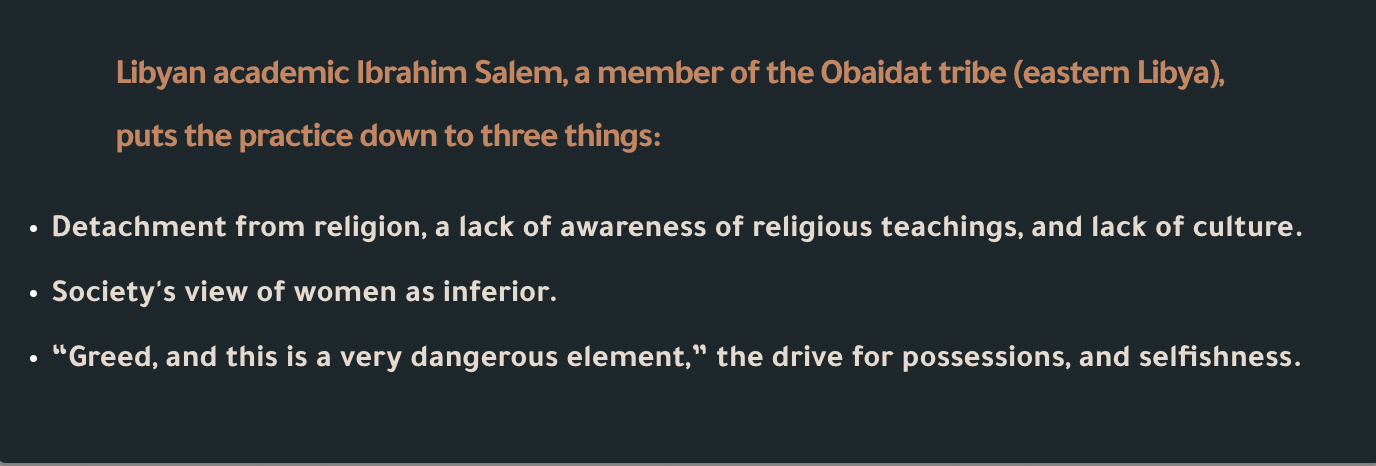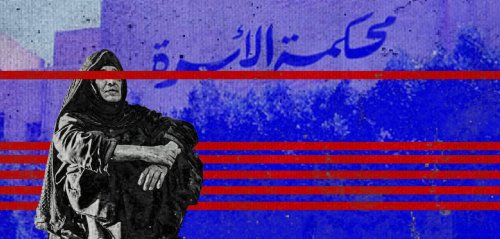This investigation exposes a traditional practice in Libya that enables men to monopolize inheritance of property to the exclusion of women, on the pretext that a woman might pass the property on to her husband and that the family property would be divided and lost, lowering the social standing of the family.
Fathia (pseudonym) feels sadness whenever she walks past the building in which she grew up in the city of Misrata. She believes that she should, by rights, have inherited the building from her father, but her brothers took it for themselves, leaving nothing for her and her sister.
In Libya, there are social norms that deprive a woman of her right to inherit property. If a woman’s father dies, her legal rights are withheld by her brothers or uncles, and thus, it is now abnormal for women to obtain their stated share of properties passed on to them by the deceased.
Fathia, from western Libya, has one sister and five brothers. When their father died, she and her sister failed to receive their share of his inheritance. All of her paternal grandfather’s estates were also in her father’s name, who did the same thing with his sisters, preventing them from receiving their share of the inheritance. Everything went to Fathia’s father. This pattern is repeated again and again in Libya, along generations, instilling a resentment in women, who see no way to stop their inheritance being taken by the men of the family.
Fathia is far from the only victim of this practice. There are many cases of women in Libya speaking out about the tyranny and controlling behavior of their male relatives, and their weakness as they are deprived of rights under the pretext of traditional custom and practice. But most of the time, such conversations are held in a whisper behind closed doors. Again, custom prevents women from speaking out about any pain they might feel.
When Fathia demanded that her brothers give her what is rightfully hers, they were shocked, given that most women stay silent on this issue. They responded, “We do not have daughters who inherit from their fathers. The family does not inherit or hand down property to women.”
Why women are denied property
Property is regarded as one of the sources of tribal power and status in Libya. So, for many years, custom has dictated that properties should be inherited by men alone, since they carry the family name. If women marry outside the family, they are not allowed a share in the property, for fear that it will pass to their husbands, thus increasing the power and status of a different tribe or family, at the expense of the family of the deceased.
Sometimes brothers will compensate their sisters financially in lieu of property, so as not to be accused of acting unjustly. But according to the women impacted, this “meager” compensation cannot be compared to their rightful inheritance. It is a “gift” meant to “placate” women, not an acknowledgement of their inherent right as a beneficiary, as stated in both religious and civil law.
Property is regarded as one of the sources of tribal power and status in Libya. For years, custom has dictated that property should be inherited by men, since they carry the family name. If women marry outside the family, they are not allowed a share in the property, for fear that it will pass to their husbands, thus increasing the power and status of a different tribe or family, at the expense of the family of the deceased.
Mabrouka Besikri, Director of the International Arab Organization for Women's Rights, has come across many similar cases in the Nafusa Mountain region in eastern Libya, southwest of the capital Tripoli. She explains that brothers deliberately deprive their sisters of their rights as co-inheritors of land. They claim that a woman will bring a stranger into their midst, and on this basis, they take away from the woman her right of inheritance. Besikri adds, “It is possible that some families will give women financial compensation in exchange for their right to land, but they end up owning no land, property, or anything else. This is a clear and obvious injustice, and many organizations have called for it to be brought to an end.”
For his part, Academic Musa Al-Qunaidi, who teaches at the University of Misrata, describes as “weak and feeble” the justifications put forward by male heirs that their “sustenance” will be lost to the family of the daughter’s husband.
Salem adds, “A few families do give a woman the right to inherit, but the overwhelming majority withhold this right from her.”

The dominance of this traditional practice led Mabrouka Besikri and her team to demand that Libyan women be given the right to inherit.
Human rights activist Manal Al-Hanashi calls on every individual and institution in society to work to protect a woman’s right to inheritance and to achieve this through legal means. “The state and the judiciary must put in place laws and procedures to stop women’s inheritance rights from being ignored or abused, to hold accountable any law breaker, and to spread a culture of justice and equality. Family, schools, and society all need to bring up future generations to respect and appreciate women’s right to inherit.”
Musa Al-Qunaidi believes that, before any discussion of constitutional and legal action, something needs to be done to raise the level of awareness among those sections of society which stand in the way of the right of women to inherit.
Like hitting your head against a wall
Fathia was biding her time, waiting for the chance to return to the issue of her stolen inheritance, when she heard that her brothers had sold some of her father’s property to people outside the family. So, the very thing they claimed they were afraid of – that family property would be lost by falling into the hands of others – had actually happened.
Fathia raised the issue again and demanded that her brothers give her and her sister their share in the remainder of the inheritance – which consisted of many plots of land – and that they should receive the same share as the men. In return, she would excuse them for the way they handled the original division of the inheritance. The brothers stuck by the tribal custom, but after strenuous attempts by Fathia, they finally compromised and gave her a sum of money in exchange for her share in the building that had been sold, but without informing her of its true value or the sale price.
Fathia is fully aware that her brothers have in their possession not only her father’s money, but also the inheritance that had been due to her aunts, who have received nothing. But none of her efforts, either on her own or her aunts’ behalf, have yielded any result. And her brothers have continued to sell off land whenever they need, to fund their children’s marriages, the upkeep of their livelihood, or other things.
In every family
Fatima had no more luck than Fathia. She has three sisters and two brothers. After the death of their father, the father’s property in its entirety – worth millions of dinars - was inherited by the two sons, leaving the three sisters empty-handed.
Fatima was reluctant to come out and speak in this report, since the brothers are keen to prevent their sisters from airing their grievances publicly, or going to court, or even discussing the matter.
The author of this investigative report sought the help of a property assessor, and Fatima gave him information on all the properties her father left to them upon his death. The assessor calculated the total value of all these properties at the current price and, based on the correct legal apportioning of the property, it turned out that Fatima’s share was worth approximately 2.7 million Libyan dinars (about $800,000).
The assessor also calculated the market value of the properties inherited by Fathia and her brothers. In this case also he divided the inheritance based on the correct legal distribution. And it turned out that Fathia’s share of this inheritance was equivalent to about one and a half million dinars (approximately $300,000).
The law protects the women’s rights
Musa Al-Qunaidi, a specialist in public law and lecturer at Misrata University, says, “When we talk about law in this context, we are talking about Law No. 6 of 1959, regarding the protection of women’s right to inheritance. Article 2 stipulates that it is impermissible to withhold payment of the share of inheritance to which a woman is entitled. And Article 5 stipulates that anyone who violates the provisions of this law shall be punished by imprisonment as well as being made to pay the woman the share of the inheritance to which she is entitled.”
Musa Al Qunaidi audio recording
For audio recording translation please Click Here.
Ahmeed Al-Mourabit Al-Zaydani, head of the Victims Organization for Human Rights, agrees. He says that depriving women of inheritance constitutes violence against them. Based on Article 2 of Law No. 6, he argues that it is impermissible to withhold from a woman her rightful share of inheritance, or to prevent her from benefiting from it or disposing of it.
Ahmeed Al Zaydani audio recording
For audio recording translation please Click Here.
On the question of substituting a financial reward for the rightful inheritance, Al Zaydani says that, as long as this is done with the woman’s complete consent, and there is no coercion or fraud involved, then there is no problem with such a substitution, provided the woman has full legal capacity and is over the age of eighteen. The compensation must also equal the real value of the inherited property or possessions.
Ahmeed Al Zaydani audio recording
For audio recording translation please Click Here.
However, if the compensation is made under coercion – seizing her share of the inheritance, and forcing her to accept financial compensation under the pretext that the inheritance from the property will go to a stranger (her husband) – then this is not permissible and is a violation of the text of Article 2.
Some women were able to obtain judicial rulings on their inheritance rights and were forced – under threat – to give them up. Others were pressured to accept small sums of money or even remain silent about their rights without any of the “consolation” amount they are sometimes given
Holding on to traditional customs and norms
Muhammad Al-Ghaithi, a member of the Committee of Elders and of the Dispute Resolution Committee, sees no objection to the fact that assets and property are inherited by male heirs only. He says that this is common practice in the eastern region and even in all of Libya.
For Al-Ghaithi, the reason is that “across Cyrenaica, the prevailing practice is that a person owns a particular plot of land that belongs to him entirely and exclusively.”
According to Al-Ghaithi, splitting up land means it will be wasted, and divided between tribes, “What we are seeking usually is for the entire land to be ours as one family; this is the main reason.”
Al-Ghaithi points out that some people do not have much money to pass on when they die, but do have a lot of property. So, males who inherit are not able to compensate female heirs financially for their share in the property. They therefore take full possession of it. He says, “We know that this is forbidden by law, but the brothers who inherit are not able to price the land and give money in compensation.”
What happened to the law?
Today there is much discussion and back and forth about the law - now in its 65th year – as the country waits for a “new” constitution, which is in the process of being drafted. In 1973, the Libyan state suspended the constitution, established in the 1950s, on orders from Muammar Gaddafi, who ruled Libya from September 1, 1969 until February 2011. Gaddafi ordered the abolition of all laws and regulations in force in Libya, and so the state has no constitution. The majority of laws today are those that were in force when Libya was a kingdom under the country’s founder, King Idris al-Senussi.
Maryam Hussein, a member of the Constitution Drafting Assembly (CDA), explained to us about how women are deprived of rights to inherit and how the CDA sees this. Article 49 of the draft Libyan constitution stipulates that “the state is committed to: supporting and caring for women and enacting laws that guarantee their protection and raise their status in society; eliminating negative culture and social customs that detract from their dignity; prohibiting discrimination against them; guaranteeing their right to representation in general elections; and providing them with opportunities in all fields, while all necessary measures will be taken not to prejudice or harm rights women have acquired and to support them.”
Custom rules
Only discussing laws and constitutions does not get to the heart of the problem, though. The issue is not that easy, according to Dr. Salma Al-Shaeri, a specialist in contemporary social issues. She says that for Libyan women to demand their inheritance through the courts and judicial system is considered shameful by society and damaging to a family’s reputation. This in turn leads to more persecution and oppression of women and the harnessing of all means to prevent them from gaining their rights. “In fact, things have gotten to the stage where some families have stolen the identity of women so as to waive the right to inheritance in their name. This case recently happened in the city of Derna,” she says.
Even though the constitution remains suspended, laws are still in force. The author of this report has managed to obtain a complaint filed by two women in one city against their brothers. The men had categorically refused to give them the inheritance due to them from their father, who left properties worth millions, forcing them to go to court.
When the men appeared before the judge and were faced with the legal documents, they promised to give their sisters what was rightfully theirs. The two women therefore concluded that the matter had been resolved. But the men did not keep their promise, showing that social custom in Libya can even prevent judicial rulings being implemented. The brothers have gone as far as threatening that their sisters will be killed if they make any further complaints.
“Women are intimidated or persecuted if they make a complaint against their brothers to obtain their rightful share of the inheritance. Lack of knowledge leads some women to sign documents giving up their rights to an inheritance in return for a symbolic sum of money, which is paid just to silence them.” Some women have even faced death threats.
"If the case comes to court, social customs remain a stumbling block for women when trying to secure their rights to inheritance" Musa Al-Qunaidi argues that when it comes to punishment, this is a matter for judges not legislators. Every crime has its appropriate punishment, and the judge has the right to sentence people to between one day and three years in prison, according to the law.
Back to pre-Islamic times
“Depriving women of inheritance is a remnant from pre-Islamic times. Women had no inheritance rights until Islam came and removed this injustice against them.”
So says Dr Salma Al-Shaeri, a specialist in contemporary social issues. She points out that the problem goes beyond depriving women of their rightful inheritance and has devastating social effects, including stoking hostility and hatred between a sister and her brothers. It can affect sons and daughters on both sides, while some women may resort to taking some action in revenge, which would harm the reputation of the family.
Dr Al-Shaeri also argues that depriving women of a large portion of their property inheritance creates an economic disparity between them and their brothers, who alone benefit from the returns on the property, while the women remain economically inferior.
Women are the answer
The public prosecution service cannot initiate a criminal case on its own, explains Musa Al-Qunaidi, but needs first to receive a complaint from an inheritor claiming her rights from brothers or other relatives. Only after that can the prosecution proceed with the case.
Al-Qunaidi believes that the problem comes down to the fear that women have, and their failure to act against those who withhold their rights from them. Alongside this are customs and traditions and the failure of the executive agencies of government to carry out their duties once the matter reaches court.
Ahmeed Al-Mourabit Al-Zaydani, head of the Victims Organization for Human Rights, agrees. He says that depriving women of inheritance constitutes a violation against them, according to Article 2 of Law No. 6. He believes that it is impermissible to not give a woman the share of the inheritance to which she is entitled, or to prevent her from benefiting from it or disposing of it.
“Women can be intimidated or persecuted if they make a complaint against their brothers. Lack of knowledge leads some women to sign documents giving up their rights to an inheritance in return for a symbolic sum of money, which is paid just to silence them. But then they say they were forced into it,” says Al-Qunaidi.
Women can sometimes even face death threats. “Money makes people lose their minds,” as the popular saying in Libya has it.
***
Fathia used to lower her head whenever she passed by the building which she believed should be hers, in full or in part, according to Islamic law. But today she is more determined than ever to obtain what is due to her, and thereby become an example to other women in working to obtain their legitimate inheritance rights.
This investigation was completed with the support of ARIJ.
Raseef22 is a not for profit entity. Our focus is on quality journalism. Every contribution to the NasRaseef membership goes directly towards journalism production. We stand independent, not accepting corporate sponsorships, sponsored content or political funding.
Support our mission to keep Raseef22 available to all readers by clicking here!
Interested in writing with us? Check our pitch process here!









